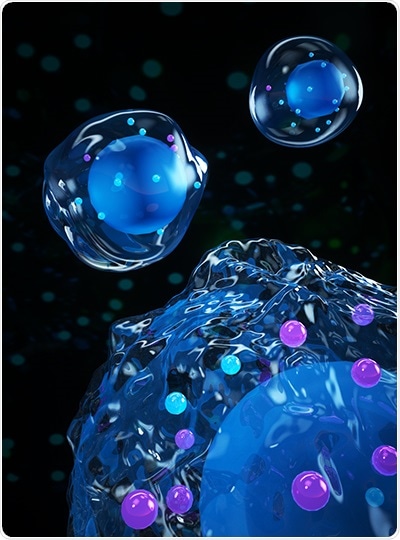Chaperone-mediated autophagy (CMA) is a self-eating process that occurs in embryonic stem cells. According to Penn Medicine researchers, this process and an associated metabolite may act as potential new therapeutic targets to regenerate or repair damaged organs and cells. The study was published online in the Science journal.

Translucently colored embryonic stem (ES) cell (upper right) and its differentiating derivatives (left and lower right). The small round bodies inside cells represent lysosomes, with the pink color indicating ones that are undergoing chaperone-mediated autophagy (CMA), a selective form of autophagy that is demonstrated only in mammals. CMA governs the balance between self-renewal and differentiation of ES cells. It is kept at low levels in undifferentiated ES cells to maintain the pluripotent state. Upon induction of differentiation, CMA flux increases due to the reduction of pluripotency factors, leading to changes in cellular metabolism and epigenetic landscape that favor differentiation. Image Credit: Alex Tokarev.
More than 200 different types of specialized cells are found in human bodies. All these cells can be obtained from embryonic stem (ES) cells, which continuously renew on their own and, at the same time, retain the potential to differentiate into any type of cells in adult animals, a state called pluripotency.
While scientists have known that the metabolism of the cells plays a major role in this process, it was not exactly clear how the internal wiring of the cells works to maintain that state and, eventually, decide the fate of stem cells.
For the first time, the new preclinical research reveals how stem cells maintain the CMA at low levels to support that self-renewal process, and how it turns off that suppression when the stem cell is ready, thereby improving CMA, besides other activities, and differentiating into specialized cells.
It’s an intriguing discovery in the field of stem cell biology and for researchers looking to develop therapies for tissue or organ regeneration. We reveal two novel ways to potentially manipulate the self-renewal and differentiation of stem cells: CMA and a metabolite, known as alpha-ketoglutarate, that is regulated by CMA.”
Xiaolu Yang, PhD, Professor, Department of Cancer Biology, Abramson Family Cancer Research Institute, Perelman School of Medicine, University of Pennsylvania
Yang, who is also the study’s senior author, continued, “Rationally intervening or guiding these functions could be a powerful way to increase the efficiency of regenerative medicine approaches.”
Autophagy—a cell-eating mechanism—is essential for the function and survival of a majority of the living organisms. When cells eat on their own, the intracellular materials are transported to lysosomes, which are organelles that decompose these materials.
There are certain types of autophagy. But unlike the other forms of autophagy, which are found in all eukaryotic cells, CMA is exclusive to mammals. The physiological role of CMA is yet to be clearly understood.
The researchers used genetic and metabolomic laboratory methods on the mice’s embryonic stem cells to further interpret the crucial changes that occur during their pluripotent state and also during their subsequent differentiation.
The researchers observed that CMA activity is kept low because of a pair of cellular factors that are crucial for pluripotency—Sox2 and Oct4—that inhibits a gene called LAMP2A. This gene sends instructions for producing a protein, known as lysosomal associated membrane protein-2, required in CMA.
The scientists found that the reduced activity of CMA enables stem cells to maintain high concentrations of alpha-ketoglutarate—a metabolite essential to reinforce the pluripotent state of a cell.
During differentiation, the cells start to upregulate CMA because of the reduction in Sox2 and Oct4. Augmented activity of CMA causes degradation of significant enzymes involved in the synthesis of alpha-ketoglutarate.
This causes a reduction in alpha-ketoglutarate levels and also increases other cellular activities to support differentiation. Such discoveries demonstrate that the fate of embryonic stem cells is governed by alpha-ketoglutarate and CMA.
Embryonic stem cells are usually known as pluripotent because of their excellent potential to develop into every type of cell in the body, except the umbilical cord and placenta. Embryonic stem cells not only offer an excellent system to examine the early development of mammals but also hold excellent potential for regenerative therapies for treating numerous human diseases.
In the last 10 years, the development of stem-cell-based regenerative medicine therapies has quickly increased with a number of methods in studies proven to repair impaired heart tissues, substitute cells in solid organ transplantation, and in a few cases, tackle neurological disorders.
This newly discovered role of autophagy in the stem cell is the beginning of further investigations that could lead to researchers and physician-scientists to better therapies to treat various disorders.”
Xiaolu Yang, PhD., Professor, Department of Cancer Biology, Abramson Family Cancer Research Institute, Perelman School of Medicine, University of Pennsylvania
Source:
Journal reference:
Xu, Y., et al. (2020) Chaperone-mediated autophagy regulates the pluripotency of embryonic stem cells. Science. doi.org/10.1126/science.abb4467.